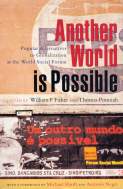Another World Is Possible. Popular Alternatives to Globalization at the World Social Forum.
William F. Fisher, Thomas Ponniah, Zed Books, UK, January 2003

We are constantly bludgeoned into believing that there are no alternatives to globalization – with its giant corporations in the driver’s seat, dominating a ‘free’ market in reality shaped in accordance with their dictates. But there are alternatives. And the movement for global justice and solidarity is giving voice to them.
This collection brings together the most important themes and voices which these rapidly growing, diverse citizens’ movements have expressed at the World Social Forum which gathers each year in Porto Alegre, Brazil. The global movement for justice and solidarity has become the major opposition to capital’s contemporary globalization.
Its power emerges from the multiplicity of activists and organizations that make it up. But its diversity also poses a challenge – how to articulate their different agendas into a shared set of proposals for alternative social models to neoliberal globalization. This book assembles some of their most constructive thinking around the key issues:
Production for profit versus production for people
Biohegemony versus biodiversity
Westernization versus cultural diversity
Corporate rule versus civil society
Neoliberalism versus the reinvention of democracy
Here is a very different human – and humane – future. It is up to all of us, as active citizens, to think further about what it could be like, and to struggle against vested interests in order to achieve it.
Chapter 7:
7. A Solidarity Economy:
Resist and Build
Economic Solidarity Group of Quebec
Conference Synthesis
Sandra Quintela (Institute of Alternative Policies for the Southern Cone) (Facilitator)
